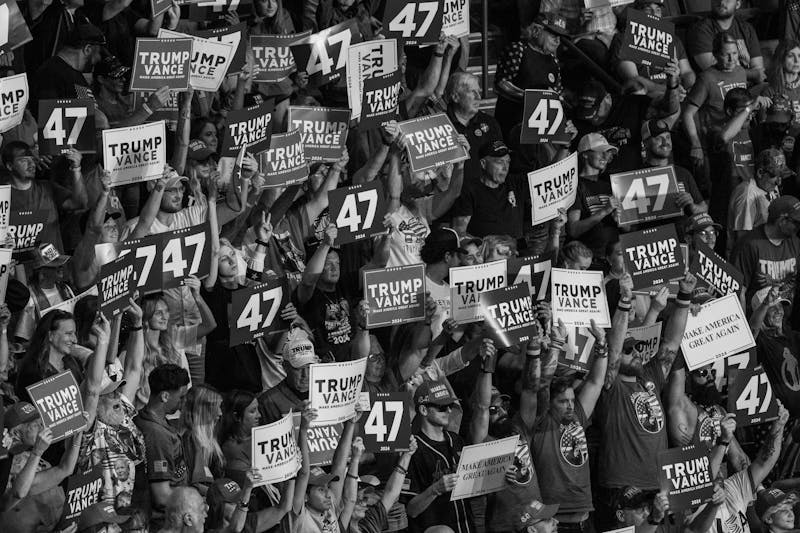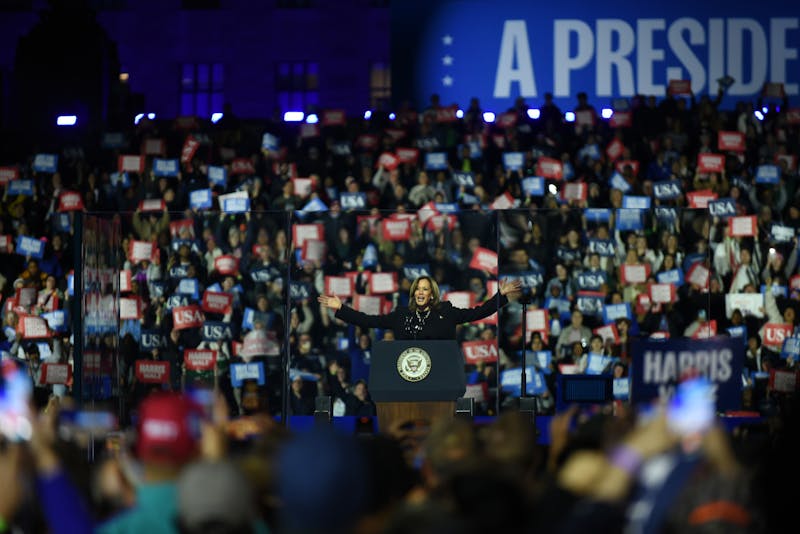
The United States is swiftly moving right. A recent piece by The Washington Post highlighted this shift, displaying that Donald Trump saw major gains in a multitude of counties across the country. In Pennsylvania, a state that was perceived as the most critical battleground, Trump received 50.4% of the vote while Kamala Harris received 48.6%.
Taking a look at the global political scene of the past few years, this phenomenon is consistent across many countries. The rise of far-right political movements promotes ideas of nativism. In Argentina, President Javier Milei said, “In my government, there will be no cultural Marxism. I won’t apologize for having a penis. I shouldn’t feel guilty for being a white, blond, blue-eyed man.” Milei’s statement is intriguing as it taps into a broader, global sentiment regarding the perceived erosion of the cultural and social identity of men overall but, more specifically, white men. This perspective reflects a growing anxiety about the displacement of traditional Western values and identities in the face of a diversifying world.
Now, while we aren’t Europe or South America, our racialized history in this country knowingly runs deep. In an interview circulating online, a man being interviewed said, “I voted for Trump because his policies, if implemented, would slow the dispossession of whites in the United States.” While this was an overtly white supremacist statement, it is likely that — at least amongst the typical, white Trump voter — this notion is subtly reinforced, even if they are not fully aware of it.
In “The Sum of Us” by Heather McGhee, she calls this very phenomenon a result of the U.S.’s “zero-sum way of thinking about race and wealth.” McGhee delves into the fact that racism actually costs everyone, regardless of racial identity, and that there are people who are willing to side with their race over policies that will ultimately benefit everyone. She goes on to explain that many people in privileged positions, especially white Americans, are resistant to policies perceived as beneficial to people of color because they view it as a zero-sum game. If programs are created that might cater to people of color, the dominant group sees it as an infringement on their rights.
However, it is also true that those who voted for Trump cast their vote for a number of reasons. While many voters seem to like what he says, many are also particularly concerned about the economy. One voter said, “I feel like [Trump] has a handle on making it about the American economy first and the American worker first.” Trump’s proposed economic plan, specifically as it pertains to tariffs, would actually increase prices and worsen inflation. Yet even then, there are numerous other reasons — abortion, gun rights, the border, or the return of Christmas — Trump voters all have something in common regardless of race or ethnicity.
While Trump voters aren’t all explicitly racist, each one of them is able to excuse his racism for their perceived benefit. An individual being racist or not isn’t a judgment that can be made without truly hearing the extent of their reasons for voting. However, their support for Trump — through all that he says and does, and by looking at the groups that support him — proves that they are more than willing to overlook racism. They are willing to ignore the atrocities for a promise of lower prices. He fooled voters into thinking he was for the working class, when, in actuality, he is continuing to support himself and his rich buddies. It is exactly as McGhee outlines in her book: This zero-sum game makes it clear that many voters really are willing to bypass some of the cruel actions and statements of Trump to keep their guns or supposedly prioritize the economy.
And yes, many Latinos showed up for Trump this election with 43% voting for him. Reasons as to why generally boil down to these two: Many Latinos identify as white and see themselves in the world as such, and Trump found other inroads with racism, xenophobia, transphobia, and fear of communism. The general consensus amongst immigrants who voted for him is, “You want to come to America? Earn it, like I did.” One man, Luiz Oliveira, even called the influx of illegal immigrants an “invasion.” However, the rhetoric being spewed by Trump and many of his followers paints a broad negative picture of Hispanics and Latinos. In many ways, the racism is directed at them; however, they don’t consider themselves to be a part of the targeted demographic.
Furthermore, Trump, “Make America Great Again” Republicans, and their supporters have convinced themselves that the identity of the white American male is under attack, much as Milei views it. One way he displayed this while campaigning was through his ad stating “Kamala Harris is for they/them, President Trump is for you.” This ad positions specific identities that liberals and Democrats tend to focus on as direct threats to Americans and American identity. While religion also plays a key role in issues around gender and sexuality, Trump’s campaign actually pushes it to the next level — insinuating this diversity is un-American. They are promoting an idea that American masculinity is under attack, and that alone could have united young male voters on the fence this election.
The anxieties over the perceived loss of identity — whether tied to race, gender, or nationalism — are driving many voters to support leaders like Trump, who skillfully capitalize on these fears. While not all supporters are motivated by overt racism or white supremacy, their willingness to overlook or excuse such rhetoric in favor of policies that they believe will benefit them economically or culturally reveals a deeper, more systemic issue.
So no, they might not all be racist, but they all overlooked it on Nov. 5.
MARIE DILLARD is a College first year studying history and urban studies from Englewood, N.J. Her email is mdilla@sas.upenn.edu.
The Daily Pennsylvanian is an independent, student-run newspaper. Please consider making a donation to support the coverage that shapes the University. Your generosity ensures a future of strong journalism at Penn.
Donate












